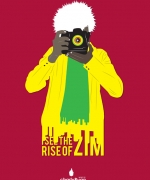The original POVO Booklet - Part 1
Chanetsa Mukahanana - The foreword
Renaissance painters studied each other’s' work right down to the brushstroke; great writers read works of past and current greats. Even medical doctors learn from their colleagues, looking over their shoulder to observe them applying their art. As humans we learn from our environment and from other people, feed off one another's creations in order to be inspired, encouraged and stimulated to excel in our own right. As visual artists we study each other's work, our eyes feed on other designers' work to nourish our creative minds. Our principles guide our fellow designers; our opinions build them while our experiences educate them. This book carries opinions, thoughts and experiences for the reader to see, read and nourish his mind and soul.
Saki Mafundikwa - Typography
The story of Afrikan alphabets is little known both within and outside of Africa. For the last twenty years, I travelled across the Afrikan continent and the Diaspora researching the alphabets’ history and usage. Few people realise that some Afrikan societies were writing before the arrival of Europeans, in fact at the time Europeans “discovered” the Vai script of Liberia in the early 19th century, literacy was more widespread among the Vai people than in certain parts of America and Britain. This reality is completely at odds with the popular “Dark Continent” theory. The purpose of my book is to provide an introduction to information in uncharted places about Afrikan alphabets – which are a way of expressing ideas, systems of thought, cultural imperatives, aesthetic preferences and spirit. They are one of the important keys to help unlock what has been kept hidden from so many for so long: that these alphabets with their deeply meaningful graphic construction show the intelligence and ingenuity of Afrikan people. In Afrika the harmony of art, nature and spirit is the rule, not the exception. In terms of the graphic arts, Afrikan alphabets show that the spiritual line is free and unencumbered by the rule of the grid. It relies on a natural freedom and fluidity. Among the alphabets that are analyzed and illustrated are scripts such as Mende, Vai, Nsibidi, Shu-mom, Tifinagh, the Somali and Ethiopian scripts. Other alphabets, syllabaries, paintings, pictographs, ideographs, and symbols are also compared and contrasted.
Micheal Danes - Identity
> my life is design >> design is objective development >> development is progress >> progress demands attention >> attention we must pay >> pay for good design >> design is life >> life is design >> design is life >> life is too short to live in constantly oppressed misery; in a world that is full of visual garbage, don't fall for ignorant instruction and add to it >> negative or positive >> black or white >> left or right >> we all share a common background >> we all exist on the same substrate >> we all use the same tools >> breath in the same environment >> love for the same reasons >> share passion in design >>
Jacob Ngandu - Graphics Association of Zimbabwe (GRAZI) - Against all odds.
There is no association apart from its people- an association is inseparable from its membership. The absence of dedicated loyal members has ravished what could have been a body that would have lifted the quality of graphic arts design in Zimbabwe and contributed to the exodus of talented designers in search of greener pastures. When the Graphics Association of Zimbabwe (GRAZI) was formed in the early 90’s its influence in the design arena of Zimbabwe was evident. Often, designers came together to share ideas and also the GRAZI awards were held annually to recognize work from graphic artists at various colleges in the country. The crowning moment for the association was participation at the ICOGRADA world conference in 2001 in South Africa. However, things soon took a negative turn as the Zimbabwean economy collapsed and forced designers to become more individualistic to make ends meet in a tough operating environment. This saw the membership of GRAZI diminish and eventually, the organization was suspended. There was no input from the design community in terms of support as such, GRAZI faced certain premature death. However as human beings, there is always the spirit of holding onto something which we strongly believe in. Thus, a new breed of passionate people got together to revive the association through a number of events which included a web development workshop, being successfully held. However, within a few months the negative forces of the economy and pressures of work soon consumed the members’ newly found vigor and the association collapsed once again. Yet another opportunity to revive GRAZI presented itself. The Icograda had offered to admit the association within its membership without members having to pay annual subscriptions. A group of members took advantage of this to revive operations of the association, albeit on a low key note for the past year. Individuals still receive and pass on e-mails on what‘s happening in the design community locally and internationally. The fire still burns; one day it shall burn brighter.
Jane Shepherd - The extra in the ordinary - Introducing cultural context into design education in Zimbabwe.
Advertising bill boards line the road from Harare International Airport to the city center. ‘To prosper in Africa first put yourself in its shoes’, reads one billboard from the African Corporation Bank, accompanied by an image of a very uncomfortable looking pair of carved stone sandals. The image is a reference to the Zimbabwean tradition of stone sculpture but is unintentionally accurate in conveying the difficulties ordinary Zimbabweans face on a daily basis. Unlike tradition, which only allows for evolution over long periods of time, design can change an artifact immediately to transform a problematic reality into a desirable one. But the process is often seen as a one-way communication ignoring the mediating role of the artifact between designer and audience. In the Zimbabwean context, where an economy and political structure favors the elite, people’s needs and responses are rarely investigated. Design solutions can transcend the narrow remit of commercial briefs and address problems within the community. Examples of small-scale design solutions include Trevor Bayliss’s clockwork radio for African communities and Chilean designers, Angelo Garay and Andrea Humeres, packaging for light bulbs that could be adapted as light shades in poor households where bare lights bulbs are the norm. These projects impact not only on local problems but also shape the potential role of design on a global platform. The process of moving towards greater understanding of what could be a humanizing and transforming practice involves connectivity to cultural contexts, starting with what is known and yet unknown.




